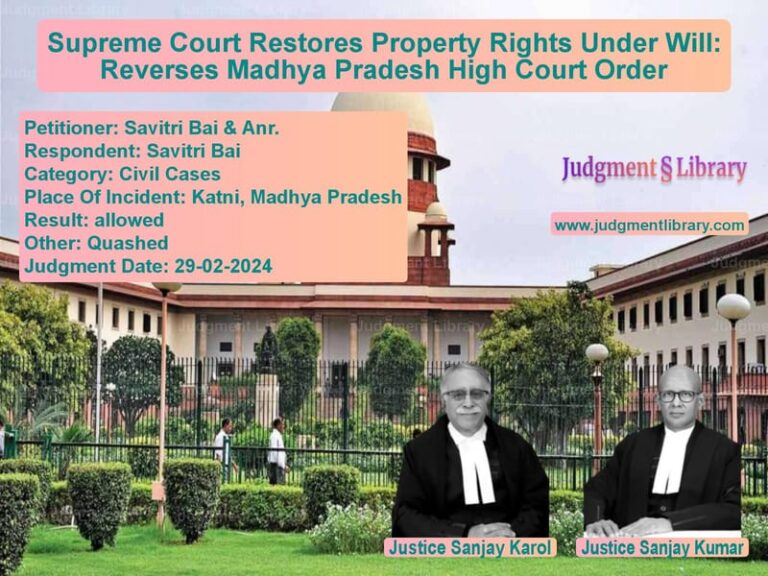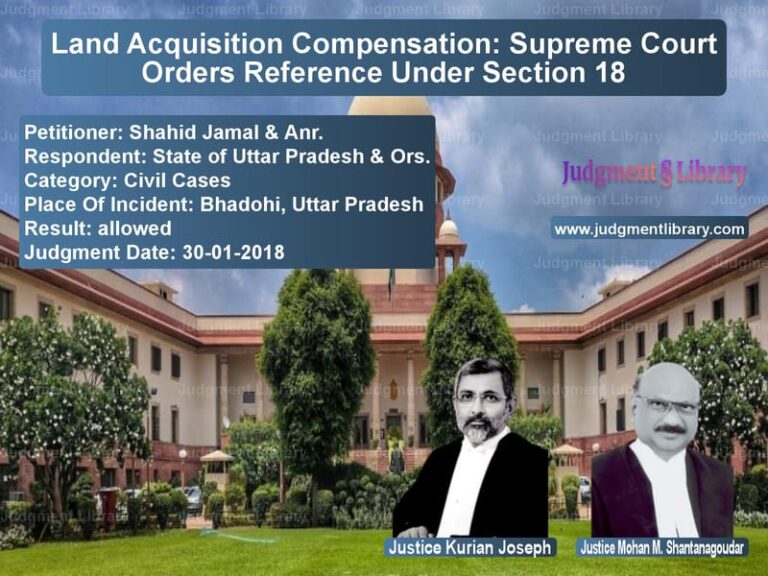Land Acquisition Dispute: Supreme Court Upholds Right to Compensation
The Supreme Court of India recently delivered a significant ruling in the case of Land and Building Department, Government of NCT of Delhi vs. M/S Mass Estate (P) Ltd. and Anr.. The case revolved around the government’s failure to take possession of the acquired land or compensate the landowners within the legally prescribed period. The Court ultimately ruled in favor of the landowners, reinforcing the protection offered under the Right to Fair Compensation and Transparency in Land Acquisition, Rehabilitation, and Resettlement Act, 2013.
The ruling highlights crucial issues surrounding land acquisition, government accountability, and the legal rights of property owners. It also serves as an essential precedent for future cases where government agencies fail to fulfill their obligations within the stipulated timeframe.
Background of the Case
The case originated from a land acquisition process initiated by the Land and Building Department, Government of NCT of Delhi. The department sought to acquire land for public purposes but failed to take possession or compensate the landowners within the legally required five-year period. The department claimed that an interim order was in effect for adjacent land acquisitions, which allegedly prevented them from proceeding with this case.
Arguments by the Petitioner (Government of NCT of Delhi)
The government presented the following arguments:
- Due to a pending legal dispute and interim orders affecting adjacent land acquisitions, possession of the land in question could not be taken.
- As a result, the compensation process could also not be completed.
- The government had not willfully neglected its duty but was restricted by legal constraints.
Arguments by the Respondent (M/S Mass Estate (P) Ltd.)
The respondent countered these claims with the following arguments:
- There was no legal stay or restriction in place on the specific parcel of land in dispute.
- The government had a legal obligation under the Right to Fair Compensation and Transparency in Land Acquisition, Rehabilitation, and Resettlement Act, 2013 to either take possession of the land or compensate the landowners within five years.
- The government’s failure to act within the prescribed time resulted in an automatic lapse of the acquisition.
Supreme Court’s Observations
After hearing both sides, the Supreme Court rejected the government’s justification and ruled in favor of the landowners. The Court emphasized that:
“It is the case of the appellants that possession could not be taken and compensation could not be paid because of interim order operating in the case of adjacent acquisitions.”
However, the Court noted that the adjacent case had no direct bearing on this particular land acquisition:
“It is not in dispute that in the case of the respondents herein, there was no stay operating.”
Since there was no valid legal barrier, the government had no justification for failing to take possession or compensate the landowners:
“Therefore, nothing prevented the appellants from either taking possession or paying the compensation to the respondents.”
The Supreme Court further stated that since neither possession was taken nor compensation paid within the stipulated five-year period, the acquisition had lapsed as per Section 24(2) of the 2013 Act:
“Neither having been done within five years, as contemplated under Section 24(2) of The Right to Fair Compensation and Transparency in Land Acquisition, Rehabilitation and Resettlement Act, 2013, we find no merit in this appeal, which is, accordingly, dismissed.”
Final Judgment
The Supreme Court dismissed the government’s appeal and upheld the landowners’ right to retain their land. The ruling emphasized that procedural delays and administrative inefficiencies cannot override the statutory rights of landowners. The judgment was delivered with no costs imposed on either party.
Legal Significance of the Judgment
This case sets a critical precedent in land acquisition disputes by:
- Affirming that failure to take possession or pay compensation within five years results in an automatic lapse of the acquisition.
- Establishing that adjacent legal disputes do not justify the government’s inaction in a separate acquisition process.
- Reinforcing the importance of adhering to the provisions of the Right to Fair Compensation and Transparency in Land Acquisition, Rehabilitation, and Resettlement Act, 2013.
Impact on Future Cases
The ruling strengthens legal protections for landowners facing prolonged government inaction in acquisition cases. It sends a clear message that:
- Government agencies must strictly comply with the time limits prescribed under the 2013 Act.
- Landowners have the right to challenge and nullify acquisitions that do not meet legal requirements.
- Judicial scrutiny remains a crucial safeguard against arbitrary or unjustified land acquisitions.
Conclusion
The case of Land and Building Department, Government of NCT of Delhi vs. M/S Mass Estate (P) Ltd. underscores the importance of adhering to legal deadlines in land acquisition processes. The Supreme Court’s decision ensures that landowners are protected from administrative delays and unjustified government claims.
This ruling reaffirms the judiciary’s role in upholding the rights of property owners and ensuring fair compensation in land acquisition matters.
Don’t miss out on the full details! Download the complete judgment in PDF format below and gain valuable insights instantly!
Download Judgment: Land and Building De vs MS Mass Estate (P) Supreme Court of India Judgment Dated 18-04-2017.pdf
Direct Downlaod Judgment: Direct downlaod this Judgment
See all petitions in Property Disputes
See all petitions in Contract Disputes
See all petitions in Damages and Compensation
See all petitions in Judgment by Kurian Joseph
See all petitions in Judgment by R. Banumathi
See all petitions in dismissed
See all petitions in supreme court of India judgments April 2017
See all petitions in 2017 judgments
See all posts in Civil Cases Category
See all allowed petitions in Civil Cases Category
See all Dismissed petitions in Civil Cases Category
See all partially allowed petitions in Civil Cases Category







